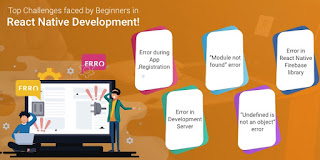The Pros and Cons of Ionic Vs React Native: A Comparative Analysis!
Mobile app development has sky-rocketed in recent times to meet the ever-rising customer demand. It has been observed that app creators prefer building cross-platform and Hybrid applications as they turn out to be highly profitable. The frameworks that are frequently being picked for cross-platform and hybrid app development are React Native and Ionic respectively. The reason is that both React Native and Ionic are open-sourced under the MIT license and are capable of creating high performing applications that function smoothly on multiple platforms. But, like all other frameworks, these too have their share of upsides and downsides.
This article compares the opportunities and obstacles associated with React Native and Ionic app development. This comparative analysis would prove beneficial for those planning to leverage these frameworks for their next project.
Ionic vs React Native: An overview of the opportunities and obstacles
Introducing Ionic and React Native
The Ionic framework is a free and open-source UI toolkit used for architecting mobile apps and PWAs, employing web technologies such as JavaScript, CSS and HTML. Ionic not only provides components that are based on web technologies as well as mobile-optimized; but also offers native API employing Ionic Native and Capacitor. Its original version, which came into being in 2013, was created on top of AngularJS and Apache Cordova. The latest updated version launched in 2019, supports numerous front ends. Thus, presently, one can architect a Hybrid mobile app in Ionic with React.js, Angular, Vue.js or plain JavaScript. Check why Ionic is a perfect pick for PWA’s too, using this link.
React Native is comparatively a newer framework coined by Facebook in 2015. It creates mobile apps for the iOS and Android platforms employing JavaScript and is also capable of implementing features with the native code. React Native is a great choice for building cross-platform apps due to the availability of native components that are platform-agonistic. These components map into the native UI building blocks of the platform. React Native development can even create apps for Android TV and Apple TV, with the help of a few additional steps.
The advantages of Ionic
- Ionic is easy to use due to the presence of pre-built components and plugins.
- Features like pre-rendering, hardware accelerated transitions, AOT compiling, and touch-optimized gestures enable an Ionic application to run smoothly thereby providing enhanced performance to the ionic apps.
- The code editor that exists within the Ionic Creator eases out the developers’ efforts while creating the code. The Ionic eco-system also offers text editors and IDEs such as Visual Studio Code, Atom, Sublime Text, etc. All these features bring more flexibility in the development environment.
- It runs on the mobile, desktop as well as the web.
- Ionic developers encounter an easy learning curve.
The documentation is clearer in comparison to that of React Native as all native modules can be found in one place rather than being scattered in GitHub.
The drawbacks of Ionic
- The Ionic community is not as strong as that of React native which makes it more difficult for Ionic app developers to receive help.
- Ionic development relies on Cordova which is not so developer-friendly.
- Despite the availability of various native plugins, one wouldn’t find a plugin for all native features. In such cases, the developers have to create plugins which is time-consuming.
- Ionic is unable to deliver up-to-the-mark performance in case of apps with heavy graphics.
- As Ionic is built above the ‘web browser’, it becomes difficult for the app code to access the native features.
The advantages of React Native
- React Native apps perform like purely native apps built in Objective-C, Java, or Swift.
- The apps turn out to be highly scalable owing to its component-based architecture.
- The hot reloading feature enables instant reloading of the app and the developers do not need to recompile the code every time. This saves their time and effort thereby speeding up the developmental process.
- Previously existing open-sourced modules are available for most of the native features that are generally required by a React Native app development Company.
- The cross-platform apps created in React Native perform much better than Hybrid applications. Click here for more information.
- It enjoys support from a huge and vibrant community that help developers.
- More than 95% of the JavaScript codebase can be shared across iOS and Android apps.
- There are many ready-made components available, so code need not be written from scratch, this also increases development speed.
The drawbacks of React Native
- The learning curve is steeper in comparison to Ionic. However, this problem can be addressed by employing tools like Expo. But due to Expo’s limited APIs, it becomes difficult to add unique native features, apart from the ones that are already provided.
- A certain amount of native code will need to be written if the app needs access to cameras or hardware of the device.
- Since the collection of ready-made components is limited, developers are restricted to creating simple apps.
- One of the commonest problems of React Native development is the large-sized apps it creates.
- React Native is still in Beta version and so we cannot ignore the possible risks in the years to come.
Final verdict
Now, being well versed with the pros and cons of Ionic and React Native, it will be easier for you to pick the right framework based on the availability of the required skillset and your project needs. Pick React Native for creating sophisticated native-like features or delivering a rich UX. Go with Ionic if you intend to create lightweight apps for the mobile as well as the web with limited resources and within a short period.
Planning to build outstanding mobile apps? Contact Biz4Solutions, a notable mobile app development company, offering both React Native and Ionic app development services. Write to us at sales.enquiry@biz4solutions.com.



Comments
Post a Comment